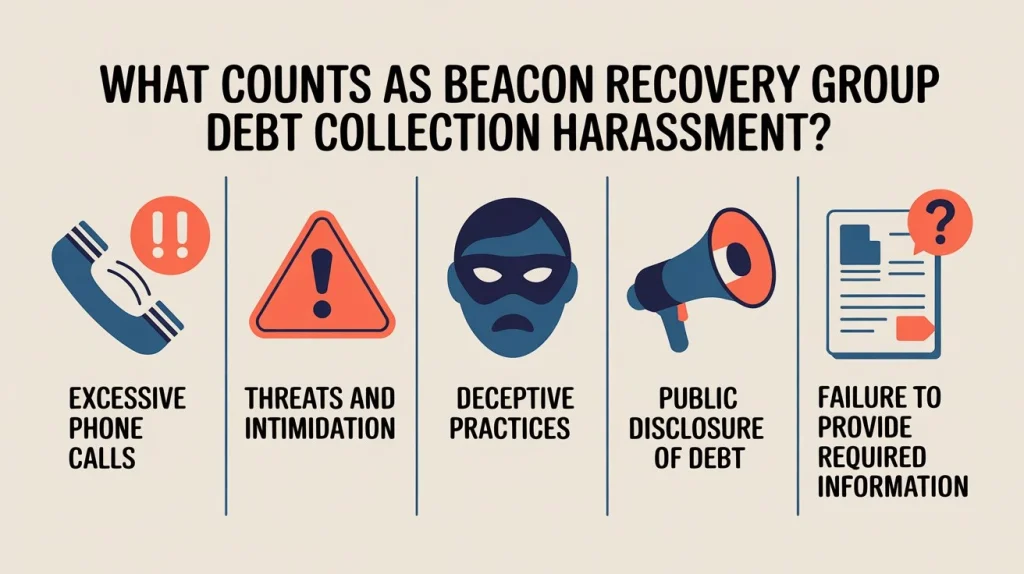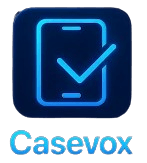Debt collection can be stressful, especially with repeated calls, letters, or messages. While some collectors follow the law, others, like Beacon Recovery Group, may use aggressive tactics. Knowing your rights under the Fair Debt Collection Practices Act (FDCPA) and spotting harassment signs can help you respond safely. Many debts from credit cards to payday loans (“Beacon payday loans”) end up with agencies like Beacon Recovery Group.
In 2026, collectors increasingly contact people through texts, emails, and multiple phone numbers. Keep records of every call or message, and don’t feel pressured to respond immediately, these steps are now just as important as knowing your FDCPA rights. Let’s know how to deal with their harassing call and remove them from credit card report.
Who is Beacon Recovery Group LLC?
According to their website, Beacon Recovery Group is a new and fast-growing accounts receivable resolution agency located in Western New York. Our leadership team brings decades of industry experience to Beacon Recovery Group, LLC, which is cascaded down to a top-notch training program which enables our team to perform at an extremely high level.
According to the Better Business Bureau website, there have been 8 complaints closed out in the last 3 years and 3 complaints closed out in the last 12 months. Beacon Recovery Group has been in business since 2019.
- Beacon Recovery Group Address: 46 Pine St Lockport, NY 14094
- Beacon Recovery Group Phone Number: (844) 734-3546
What Counts as Beacon Recovery Group Debt Collection Harassment?
Beacon Recovery Group Debt collection harassment occurs when a debt collector uses aggressive, abusive, or deceptive tactics to pressure an individual into paying a debt. The FDCPA, enacted in 1977, is the primary federal law that governs debt collection practices and protects consumers from harassment. The FDCPA outlines what debt collectors can and cannot do when attempting to collect a debt.
Common forms of Beacon Recovery Group debt collection harassment include:
- Excessive Phone Calls: Repeatedly calling a consumer, especially at inconvenient times, with the intent to annoy, harass, or abuse.
- Threats and Intimidation: Using threats of violence, legal action, or other dire consequences to scare the consumer into paying.
- Deceptive Practices: Misleading the consumer about the amount owed, the identity of the debt collector, or the consequences of not paying the debt.
- Public Disclosure of Debt: Discussing the debt with third parties, such as family members, friends, or employers, in an attempt to embarrass the consumer.
- Failure to Provide Required Information: Not providing the consumer with a validation notice, which includes the amount of the debt, the name of the original creditor, and the consumer’s right to dispute the debt.

Your Rights When Dealing With Beacon Recovery Group
If you are being harassed by Beacon Recovery Group debt collection harassment or any other debt collector, it’s important to understand your rights under the FDCPA. Here are some key protections the FDCPA provides:
- Right to Cease Communication: You have the right to request that a debt collector stop contacting you. You can do this by sending a written request to the debt collector. Once they receive your request, they are only allowed to contact you to confirm that they will no longer be contacting you or to inform you of any legal action they intend to take.
- Right to Dispute the Debt: If you believe that the debt is not valid or that the amount is incorrect, you have the right to dispute the debt. You must do this in writing within 30 days of receiving the debt validation notice. Once you dispute the debt, the debt collector must cease collection efforts until they provide you with verification of the debt.
- Right to Sue for Violations: If a debt collector violates the FDCPA, you have the right to sue for violations in federal or state court. If you win your case, you may be awarded damages, including statutory damages up to $1,000, actual damages, and attorney’s fees.
- Protection Against False Statements: Debt collectors are prohibited from making false or misleading statements when attempting to collect a debt. This includes misrepresenting the amount owed, falsely claiming to be an attorney, or threatening legal action that they do not intend to take.
- Consider Legal Action: If the harassment continues, or if the debt collector has violated your rights, you may want to consider taking legal action. An attorney who specializes in consumer protection or debt collection defense can help you understand your options and pursue a lawsuit if necessary.
How to Remove Beacon Recovery Group From Your Credit Report
Follow these simple steps to dispute or remove Beacon Recovery Group from your credit report:
1. Get Your Credit Reports
Request free reports from Experian, Equifax, and TransUnion.
2. Check for Errors
Look for:
Wrong balance or dates
Accounts not yours
Duplicate listings
Missing creditor info
3. Request Debt Validation
Send a written validation letter within 30 days of contact. Ask for:
Original creditor name
Account documents
Amount owed
4. Dispute With Credit Bureaus
File disputes with bureaus reporting the account. Include:
Account number
Reason for dispute
Supporting documents
Bureaus must investigate within 30 days.
5. Negotiate Pay-for-Delete (If Valid)
If the debt is legitimate, get a written agreement to remove the account after payment.
6. Send a Goodwill Letter (If Paid)
If already paid, request removal as a goodwill gesture, highlighting your payment history.
7. Monitor Your Reports
Check your reports every 30–60 days to confirm updates. Keep all letters and responses.
8. Get Legal Help If Needed
If the account is incorrect or unverifiable, a consumer rights attorney can help you enforce your FCRA/FDCPA rights.
Conclusion
Dealing with Beacon Recovery Group debt collection harassment is stressful enough without the added burden of harassment. If you are experiencing aggressive or illegal tactics from Beacon Recovery Group, it’s important to know that your have rights. The FDCPA is designed to protect consumers like you from unfair and abusive practices, and there are steps you can take to stop the harassment and hold the debt collector accountable.
By understanding your rights under the FDCPA, documenting all interactions, and seeking legal advice, if necessary, you can protect yourself from debt collection harassment and take control of the situation. Remember, no one deserves harassment or threats over a debt, and the law protects you.

How CONSUMER RIGHTS LAW FIRM PLLC Helps Against Harassment
Consumer Rights Law Firm, PLLC is a law firm that specializes in helping clients who are facing harassment from debt collectors in any form, including telephone communication. Contact a legal professional to stop Beacon Recovery Group debt collection harassment. Our office has been assisting consumers since 2010. We have an A+ rating with the Better Business Bureau.
If you are interested in learning more about how to safeguard yourself and prevent even more Beacon Recovery Group debt collection harassment, call us at (877)700-5790 for immediate assistance or visit our website.
FAQs
What is Beacon Recovery Group on my credit report?
Beacon Recovery Group can show up on your credit report if an account is in collections. This means they are trying to collect a debt you owe. But its only legal if its really your debt and not a scam.
Is Beacon Recovery Group a debt collection agency?
Yes. Beacon Recovery Group, LLC is a third-party debt collection agency based in New York. It is one of the collection agencies based in U.S.
Who does Beacon Recovery Group collect for?
They collect debts for various creditors, including personal loans, credit cards, medical providers, and other service companies. The specific creditor should be listed in the validation notice they send you.
Will Beacon Recovery Group LLC hurt my credit score?
Yes. Collection accounts from Beacon Recovery Group can negatively impact your credit score, especially if the debt is recent. The account may stay on your report for up to seven years, even if you pay it.
How to remove Beacon Recovery Group from my credit report?
You can request debt validation, dispute inaccurate information, or negotiate a settlement. In some cases, you may need to work with a credit repair specialist. Over time, older collection accounts also have less impact on your score.
Do I need to pay for a delete with Beacon Recovery Group?
Debt collectors are not required to offer “pay for delete.” While you can ask, they may simply report the account as “paid” or “settled.” This way is better for your credit than an unpaid collection.
Should I negotiate a settlement with Beacon Recovery Group?
Yes, if you cannot pay in full, negotiating may reduce the amount you owe. Always make sure to get the agreement in writing before sending payment to protect yourself.
Is there a Beacon Settlement Group?
Yes. Beacon Settlement Group is a real estate title and settlement services company located in Maryland. It is not connected to Beacon Recovery Group or debt collection.
Is Beacon Recovery Group legit or a scam?
Beacon Recovery Group is a legitimate debt collection agency, but consumers have reported complaints about their practices. They must still follow the Fair Debt Collection Practices Act (FDCPA).
Beacon Recovery Group keep calling me! What to do?
If you feel harassed, you can tell them to stop calling and request all communication in writing. Keep a record of the calls in case you need to file a complaint for harassment.
How to get Beacon debt collector to stop calling me?
Send a cease-and-desist letter by mail. Once they receive it, they can only contact you to confirm they will stop or notify you of legal action.
What are my rights when dealing with Beacon Recovery LLC?
Under the FDCPA, you can dispute the debt and request written validation. You’re also protected from threats, harassment, and unwanted contact.
Will Beacon Recovery Group sue me or affect my wages?
They may sue if the debt is valid and unpaid. Wage garnishment is only possible if they win a judgment against you in court. Not all debts end in lawsuits.
Does Beacon Recovery Group respond to goodwill requests?
It’s unlikely. Debt collectors usually report accounts as required and don’t grant goodwill adjustments. However, it doesn’t hurt to ask in writing.
What do Beacon Recovery Group reviews say?
Consumer reviews are mixed. Some people report professional communication, while many complain about frequent calls, aggressive tactics, and difficulty verifying debts.
Are there any complaints for Beacon Recovery Group?
Yes. The Better Business Bureau (BBB) and (CFPB) have received multiple complaints. These are mainly about debt verification, communication, and collection practices.
Can Beacon Recovery Group collect on a Beacon payday loan?
Yes. If you default on a payday loan, it may be sold to a collector like Beacon Recovery Group. They can try to collect, but under the FDCPA, they cannot harass or threaten you.







